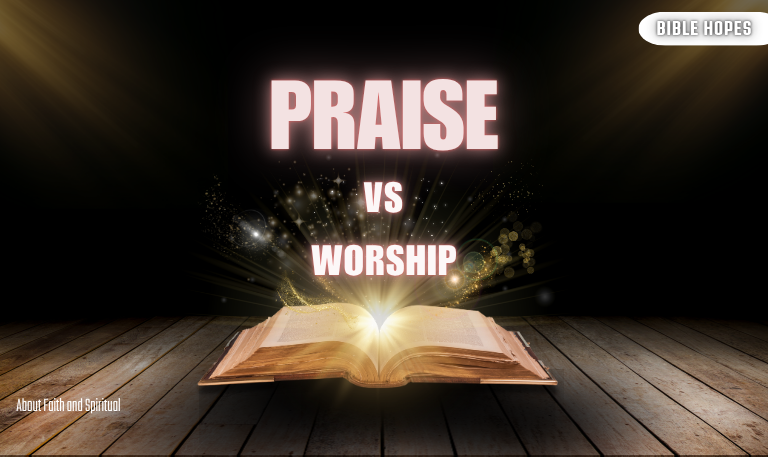In the Christian faith—and indeed many spiritual traditions—the terms praise and worship are often used interchangeably. However, while they are closely related, praise vs worship represent two distinct expressions of devotion and connection with God. Understanding the difference is essential for deepening your spiritual life, enriching your church experience, and cultivating a meaningful daily relationship with the Divine.
In this comprehensive guide, we’ll explore the biblical definitions of praise and worship, unpack their unique characteristics, analyze their roles in modern Christian practice, and address common questions about these vital spiritual acts. Along the way, you’ll discover practical insights on how to engage in praise and worship more effectively—whether in personal devotion or corporate gatherings.
1. What Is Praise? Defining Praise Biblically and Spiritually
Biblical Definition of Praise
Praise is an expression of approval, admiration, and thanksgiving directed toward God. It is often vocal and joyful, focusing on celebrating God’s attributes and deeds. The Bible frequently mentions praise in contexts that emphasize shouting, singing, clapping, and joyful noise as outward demonstrations of gratitude.
Key Scripture:
“Praise the Lord! Praise God in his sanctuary; praise him in his mighty heavens!” — Psalm 150:1
“Make a joyful noise to the Lord, all the earth; break forth into joyous song and sing praises!” — Psalm 98:4
Spiritual Meaning of Praise
Spiritually, praise is an act of recognition and declaration of God’s goodness, power, and majesty. It often stems from feelings of joy and gratitude and may be spontaneous or planned. Praise uplifts the heart and mind and focuses on acknowledging God’s blessings and greatness.
Read Also: NIV vs CSB Bible
2. What Is Worship? Biblical and Spiritual Perspectives
Biblical Definition of Worship
Worship is a deeper, reverent act of adoration and submission to God. It goes beyond mere expressions of joy or admiration and involves a posture of humility, surrender, and intimacy with God. Worship can be silent or vocal, private or corporate, but its essence is a heartfelt devotion.
Key Scripture:
“God is spirit, and those who worship him must worship in spirit and truth.” — John 4:24
“Come, let us worship and bow down; let us kneel before the Lord, our Maker!” — Psalm 95:6
Spiritual Meaning of Worship
Worship is about aligning the heart and soul with God, recognizing His sovereignty and responding in love and devotion. It transcends physical actions to encompass an internal attitude of reverence and awe.
3. Praise Vs Worship: Key Differences
| Aspect | Praise | Worship |
|---|---|---|
| Definition | Expressing admiration and gratitude | Deep reverence and adoration |
| Focus | What God does (His deeds and blessings) | Who God is (His character and presence) |
| Expression | Joyful, loud, vocal, physical | Reverent, quiet, intimate, heartfelt |
| Purpose | Celebrate, thank God | Surrender, commune with God |
| Typical Setting | Can be spontaneous and public | Often more contemplative and personal |
Praise is often external and energetic, while worship is internal and intimate.
4. Types and Forms of Praise
Praise can take many forms, including:
Verbal Praise: Singing hymns, shouting, praying aloud, declaring God’s goodness.
Physical Praise: Clapping hands, dancing, lifting hands, jumping for joy.
Written Praise: Psalms and poetry expressing adoration.
Public vs Private Praise: Praise can happen publicly in church or privately during prayer.
5. Types and Forms of Worship
Worship manifests as:
Corporate Worship: Group gatherings, church services, where believers worship collectively.
Private Worship: Personal time of devotion, prayer, meditation, or silent adoration.
Musical Worship: Slow, reflective songs designed to draw hearts closer to God.
Non-Musical Worship: Silence, reading scripture, or acts of service as forms of worship.
6. The Role of Music in Praise and Worship
Music is central to both praise and worship but differs in style and purpose:
Praise Music: Upbeat, energetic songs encouraging celebration and joy.
Worship Music: Slow, contemplative melodies that foster connection and reverence.
Both forms play crucial roles in facilitating emotional and spiritual engagement.
7. Praise Vs Worship Across Christian Denominations
Protestant Views: Often emphasize praise and worship as distinct yet complementary.
Catholic Views: Integrate worship through sacraments with praise in liturgy.
Pentecostal/Charismatic Views: Strong focus on expressive praise and spontaneous worship.
Understanding denominational nuances helps respect different expressions of faith.
8. Psychological and Spiritual Benefits of Praise
Praise offers:
Joy and gratitude boosts
Reduced stress and anxiety
Improved mood and positive outlook
Scientific studies confirm the mental health benefits of expressing gratitude and joy.
9. Psychological and Spiritual Benefits of Worship
Worship promotes:
Deeper spiritual connection
Inner peace and clarity
Transformational renewal
Worship fosters a sense of purpose and belonging that enhances overall well-being.
10. Common Misconceptions about Praise and Worship
Praise is only singing loudly: Praise includes many forms, including quiet verbal thanks.
Worship is only formal rituals: Worship is a lifestyle and internal attitude.
They are interchangeable: While related, praise and worship serve different spiritual functions.
11. Cultivating a Lifestyle of Praise and Worship
Practical ways to grow in praise and worship include:
Daily Gratitude Journaling (praise practice)
Personal Quiet Time and Meditation (worship practice)
Engaging in Church Services and Small Groups
Listening to Praise and Worship Music Regularly
Expressing Thanks and Reverence in Everyday Life
12. Praise and Worship in Modern Christian Music
Modern worship music has evolved to blend praise and worship styles, featuring artists like:
Hillsong Worship
Chris Tomlin
Bethel Music
These artists help believers connect emotionally and spiritually through song.
13. Praise and Worship in Other Religions
Though styles vary, many faiths include:
Judaism: Psalms and prayers as praise and worship.
Islam: Dhikr (remembrance) as worship.
Hinduism: Bhakti (devotion) practices.
Universal themes of reverence and gratitude appear across cultures.
Read Also: Praying Women in the Bible
14. Praise Vs Worship in the Life of Jesus
Jesus praised God openly and worshipped with deep devotion, teaching believers to honor God both joyfully and reverently.
15. Praise and Worship in Scripture: A Closer Look
Psalms: The Bible’s primary praise and worship literature.
New Testament: Emphasizes worship “in spirit and truth.”
16. Impact of Praise and Worship on Church Growth
Praise and worship unify congregations, inspire revival, and promote spiritual vitality.
17. Theological Perspectives on Praise and Worship
God desires both praise and worship as expressions of love and devotion from His people.
18. Praise and Worship in Healing and Deliverance
Biblical examples show praise and worship can bring spiritual breakthroughs and emotional healing.
19. Tips for Praise and Worship Leaders
Prepare spiritually and practically
Balance energy and reverence
Encourage participation and authenticity
Praise Vs Worship FAQs
Q: What is the main difference between praise and worship?
A: Praise celebrates God’s deeds joyfully; worship reveres God’s presence intimately.
Q: Can praise be considered worship?
A: Praise is part of worship but worship includes deeper devotion beyond praise.
Q: Is worship only done in church?
A: No, worship is both corporate and personal.
Q: How can I improve my worship experience?
A: Focus on heart posture, quiet reflection, and sincere connection with God.
Q: Why is praise important in Christian life?
A: Praise expresses gratitude and uplifts faith.
Q: Can I worship without praising?
A: Worship generally includes praise, but silent adoration is also worship.
Q: What are some examples of praise and worship songs?
A: Praise: “Shout to the Lord”
Worship: “Here I Am to Worship”
Q: How do different cultures express praise and worship?
A: Through various music styles, dance, and rituals adapted culturally.
Q: Is raising hands necessary in worship?
A: No, it is a personal expression, not a requirement.
Q: How does praise and worship impact mental health?
A: They reduce stress, increase joy, and foster spiritual peace.
Conclusion
Understanding Praise Vs Worship enriches your spiritual journey, offering distinct yet complementary ways to connect with God. While praise celebrates God’s mighty works with joy and energy, worship invites a deeper, intimate communion characterized by reverence and love. Embracing both will empower you to live a fuller, spiritually vibrant life.



![15 Pink Bible Verses | Discover Meaning, Love [2025 Guide] 5 15-Pink-Bible-Verses-Discover-Meaning,-Love-[2025-Guide]](https://biblehopes.com/wp-content/uploads/2025/05/15-Pink-Bible-Verses-Discover-Meaning-Love-2025-Guide.png)